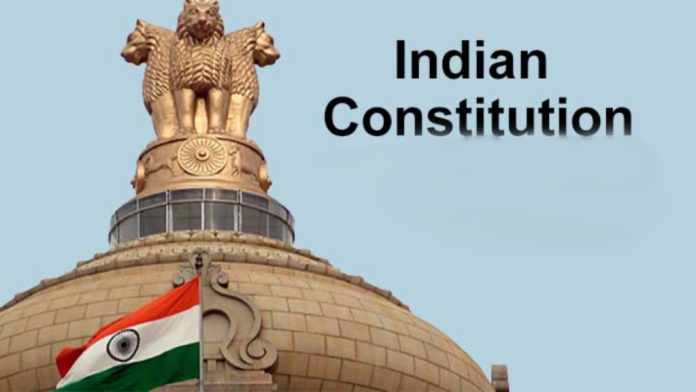This article is written by Diksha Paliwal, a student of LLM (Constitutional law). The article in the initial section deals with the concept of secularism in the Indian context, followed by a brief summary of the four Articles of the Indian Constitution pertaining to the right to freedom of religion in India. The later part discusses in detail the provisions of Article 28 along with several vital judgments in light of the same.
This article has been published by Sneha Mahawar.
Table of Contents
Introduction
India, by its very nature, is a pluralistic society and embraces a vast religious diversity. The inhabitation of several religions in the country validates the reasoning behind the development of the concept of a secular state and the inculcation of religious freedom in our Constitution. The term “secular” connotes neutrality in religious matters. There exists no doubt regarding the fact that religion has been a volatile subject in our country, and it is for this reason that the Constitution has enunciated provisions for maintaining this neutrality. Articles 25-28 of the Constitution of India provide for provisions concerning the right to freedom of religion.
India and secularism
The term “secularism” can have multiple meanings. However, a conclusive meaning that can be given to the term is that it looks for defending the absolute freedom of religion and other beliefs and simultaneously protecting religious rights by ensuring the protection of the religious rights of others. It is a unique blend of ensuring the right of individuals to religious freedom while balancing the right to be free from religion. It is essential to understand that secularism in no way supports atheism; it is just a framework provided for a democratic society. The concept of a secular state is derived from secularity; it connotes the neutrality of a state in religious matters.
The makers of the Constitution of India desired to instill the ideas of modernity and liberalism by formulating a government that would guarantee the rights of citizens and simultaneously creates the conditions for democratic citizenship. The process of secularism is continuous. Our Indian Constitution requires the non-establishment of religion; however, it does not provide for the separation of religion and state. We have a very divergent approach towards religion-state relations, which is best suited to the Indian context and conforms to the Indian Constitution. Secularism provides a platform or a political space, where religion and state can co-exist. India has been a secular state for a very long time. The rich history of India reflects the existence of all the religions in the country, and the then rulers accepted and patronised this diversity.
The concept of secularity as prevalent in India differs slightly from other nations. In almost all nations, the secular states pursue state and religion as two entirely different notions, and they don’t interfere with each other. However, India has integrated itself with the concept of secularism. Also, the state has a certain amount of power to interfere in religious matters as provided under the Constitution. The term “secular” was incorporated in the Preamble of the Indian Constitution by the legislature vide its 42nd amendment in 1976. It clarifies that there stands no official religion of the state. The Amendment intended to clarify the concept of secularism in our Constitution. Apart from the preamble, Articles 25, 26, 27, and 28 of the Indian Constitution provide for religious freedom, thereby ensuring secularism. As said by Dr. B.R. Ambedkar in his speech, by ensuring a secular state, the makers of the Constitution intended to restrict the government from having the power to impose any particular religion on the people of the country.
The term “secularism” connotes that the state will not have any religion of its own. It affirms the doctrine that the state shall protect all religions, and interfere with none. All religions are to be treated equally. It imposes an obligation on the state that it should treat all religions equally. Also, it has to extend homogeneous treatment to everybody, irrespective of their religion or beliefs. The only thing that the secular state shall focus on, is the relationship between man and man.
The purpose of secularism is to make sure that people of all religions, or atheists, can live together peacefully and fairly. It provides a safe and healthy space for both believers and non-believers. It aims to promote freedom of speech and expression and equal access to all resources, thereby promoting the concept of equality of all citizens before the law and parliament. It is the attitude of impartiality towards all religions.
In the case of S.R. Bommai v. Union of India (1994), the Supreme Court of India, comprising a 9 judges bench, held that secularism is a basic structure of the Indian Constitution. The Court further stated that politics and religion should in no way be mixed. In instances where the state follows non-secular policies or any other actions contrary to the secular state’s concept, such actions or policies will be held to be against the constitutional mandate. Before this case, the Supreme Court in the case of Kesavananda Bharati v. State of Kerala and Anr. (1973) had also opined a similar view, stating that secularism is a part of the basic structure of the Indian Constitution. The Court went on to say that the basic structure of the Constitution is not subject to amendment.
In the case of Ahmedabad St. Xavier’s College v. State of Gujarat (1974), the Apex Court held that the concept of secularism neither promotes no-god nor promotes anti-god. It entirely abolishes God from state affairs or state matters.
The Apex Court, in the case of Santosh Kumar v. Secretary, Ministry of Human Resource Development (1994), held that the introduction of the Sanskrit language in the curriculum of the Central Board of Secondary Education is in no way against the principle of secularism, the reason being that it is the mother of all Aryan languages. The Court further directed the CBSE to make necessary amendments to the syllabus, thereby teaching Sanskrit as an elective subject.
Right to freedom of religion
One of the fundamental rights guaranteed under the Indian Constitution is the “right to freedom of religion.” Now, before jumping into a brief discussion of the provisions that ensure this fundamental right, one must first understand what exactly the term “religion” means.
The term “religion” is nowhere defined in the Constitution of India, and it is impossible to provide a particular definition for such a complex term. However, the Apex Court, in a catena of decisions, has tried to define this term broadly. Religion can be denoted as a faith that an individual or a community believes in; however, it does not necessarily need to be theistic. It is a system of beliefs that are contemplated by those who profess that particular religion as accompanied by their spiritual well-being. However, the term cannot be just confined to a doctrine of belief.
As rightly said by John Stuart Mill in his essay “On Liberty,” no discussion of freedom of conscience is complete until and unless due consideration is given to the social aspect of religion. It is important to contemplate the state’s relation to the individual in matters concerning religion, along with the state’s relation to religious groups and associations. The right to freedom of religion is not a single-cut-short right, but rather a complex of rights, from the perspective of both individuals as well as social points of view.
Though it cannot be said that our Constitution provides for the unrestricted right to freedom of religion, the fact that it is included in one of the six fundamental rights provided in the Constitution says it all. The preamble itself reflects the importance of this right.
The Articles provided under 25 to 28 were enunciated to protect religion and prevent religious practices from state interference. However, the notion of non-interference has not been extracted to the extent that a particular religion impinges on or adversely affects the secular rights of Indian citizens or hinders the power of the state to manage and regulate state affairs. The interpretation of these articles by the Apex Court is done in the light that it promotes inter-religious amity and harmony. The courts in a plethora of decisions have leaned towards the minority groups and have bestowed upon them certain rights over the majority groups.
Following are the provisions concerning the right to freedom of religion under the Constitution of India;
Article 25
This Article of the Indian Constitution is titled, “Freedom of conscience and free profession, practice, and propagation of religion”, and is guaranteed to all persons, not just Indian citizens.
Article 25 (1) of the Constitution, provides for the aforementioned right to all persons, with a hint of certain restrictions. It shows that the guaranteed right is not absolute. The right as provided is subject to public order, morality, health, and other provisions as envisaged in Part III (Fundamental Rights) of the Indian Constitution. To sum up, under sub-clause (1) of Article 25, a person is entitled to two-fold freedom: freedom of conscience and freedom to profess, practice, and propagate religion.
Article 25 (2)(a) of the Constitution envisages the provision that the state is not restricted from making any law limiting or regulating any economic, financial, political, or other secular activity associated with spiritual or religious activities.
Article 25 (2) (b) further provides that the state is in no way restricted from formulating any law concerning social welfare and reform or from making Hindu religious institutions available to the public at large, including all classes and sections of Hindus.
The term “freedom of conscience” is based on the notion that an individual possesses absolute inner freedom to mould and determine his/her relationship with God in whatever manner he/she desires or wants to pursue. When this freedom of an individual becomes coherent and is intimated in an outward form, it gets converted into “profess and practice religion.”
To profess a “religion” is to freely and overtly declare his/her faith or beliefs. An individual is entitled to practise his faith and beliefs in any practical manner he desires. Performing prescribed religious duties and rituals and exhibiting religious ideas and expression as per one’s religious order is called “practising religion.” The term “to propagate” means to publicise and spread one’s religious beliefs. However, this shall be without coercion; no persuasion shall be forceful.
The protection of this Article is not restricted to matters concerning the doctrine of belief. For instance, it does not guarantee the right to convert another person under the pretext of persuasion or propagation of one’s religion. Also, it extends to all the acts done in pursuance of religion, thereby providing a guarantee for all duties and rituals that are an integral part of a religion.
In the case of Church of God (Full Gospel) in India v. K.K.R.M.C. Welfare Association (2000), the Apex Court held that noise pollution in the name of religion is not acceptable. A person is not entitled to disturb the peace of others or create noise pollution in the exercise of the rights guaranteed under Articles 25 and 26 of the Indian Constitution. The use of loudspeakers for conducting prayer was held as not an essential element of practising religion. The Court further went on to say that the order restraining the use of loudspeakers, passed under the Madras Town Nuisance Act, 1889, and the Noise Pollution (Regulation and Control) Rules, 2000, is constitutionally valid.
Article 26
Article 26 of the Constitution talks about “Freedom to manage religious affairs.” It provides for four rights for every religious denomination, namely; “to establish and maintain institutions for religious and charitable purposes”; “to manage its own affairs in matters of religion”; “to own and acquire movable and immovable property”; and “to administer such property in accordance with law.” This right guaranteed under Article 26 is subject to public order, morality, and health.
The main distinction between the rights guaranteed under Article 25 and Article 26 is that the former is an individual right and the latter is the right entitled to an “organized body,” similar to a religious denomination or part thereof.
In light of Article 26, the term “religious denomination” means a religious group or sect that has a common faith and is designated under a common name. The word has its origin in the term “religion.” Thus, in the case of a “religious denomination,” the presence of a common faith or belief based on a particular religion is an essential element. The members of such a denomination shall have a belief peculiar to themselves.
In the case of S.P. Mittal and others v. Union of India (1982), the Apex Court held that in order to satisfy the term “religious denomination” as per Article 26, one must fulfil the three conditions, which are;
- “It must be a collection of individuals who has a system of beliefs or doctrine which they regard as conducive to their spiritual well-being, that is, a common faith;
- Common organisation: and
- Designation by a distinctive name.”
Article 27
Article 27 provides for “Freedom as to payment of taxes for the promotion of any particular religion.” This Article mainly emphasises the secular character of the state. It provides that no person shall be forced to pay tax for the promotion or maintenance of any particular religion or denomination. The Article also provides that public money collected via tax shall not be spent by the state for the promotion of any religion. This Article predominantly prohibits giving aid to any particular religion. However, suppose state aid is provided to all religious institutions without favouring any single religion, along with the secular ones, without any discrimination. In that case, the same shall not be in violation of Article 27.
The rationale behind implementing this provision is that, firstly, India is a secular state, and secondly, our Constitution guarantees freedom of religion to individuals as well as religious sects; hence, paying out of public funds for the promotion of any particular religion will be against the Constitution. It is pertinent to mention here that what is prohibited under this Article is the levying of taxes, not a fee.
In the 1954 case of Ratilal Panachand Gandhi v. the State of Bombay, the Apex Court held that the term “tax” denotes the compulsory exaction of money for public purposes by public authority. The imposition of taxes is done for public purposes to meet the general expenses of the State without mention of any special advantage to be bestowed upon the taxpayer. On the contrary, a fee is a payment primarily made in the public interest but in return for any service rendered.
Article 28
Article 28 of the Indian Constitution provides for “Freedom as to attendance at religious instruction or religious worship in certain educational institutions.” The Article mainly talks about four types of educational institutions, namely;
- Institutions that are wholly maintained by the State.
- Institutions that have been recognised by the State.
- Institutions that receive aid from the State funds.
- Institutions are established under any trust or endowment and are administered by the State.
It is important to understand that for the institutions that fall under the first category, no religious instructions shall be imparted. In the second and third categories of institutions, religious instruction may be imparted with the consent of a person or guardian in the case of a minor. In the last category, no such restriction exists for religious instruction.
In the case of D.A.V College, Bhatinda v. State of Punjab (1971), the Supreme Court decided on the constitutional validity of the Guru Nanak University Act, 1969, by which the State was directed to make rules for the study and research of Guru Nanak’s life and his teachings. This provision enumerated in Section 4 of the Guru Nanak University Act, 1969, was challenged based on the contention that the provision is violative of Article 28. However, the Court decided against the petitioner and held that the Act was constitutionally valid. It further stated that the university is trying to impart academic study through the teachings of Guru Nanak, and this does not amount to religious instructions or the promotion of religion. The Apex Court also clarified that it intends to not extend the scope of Article 28 to the concept of secular, cultural, or philosophical studies or activities.
Prohibition of religious instruction in a state-aided institution : an overview of Article 28
Article 28 is categorically related to the provision of restraining religious instructions in institutions that are aided by the State. The three categories that fall under the abovementioned state-aided institutions are; those that are entirely maintained by the state, those that receive aid from the State, and those that are established under any trust or endowment and are administered by the State. The applicability of this Article is confined to state-aided institutions; it does not apply to other institutions that have no connection with the State.
The Article provides for a distinction among the three types of educational institutions, completely public, i.e., where religious education is completely prohibited; institutions, where the State acts as a trustee, in which case imparting religious education, is allowed; and institutions aided by the state, where consensual imparting of religious education is permitted.
Clause (1) of Article 28 provides that no religious instruction is to be imparted by any institution that is wholly maintained by out-of-state funds.
However, Clause (2) of this Article, states that this provision does not apply to educational institutions which are maintained from state funds, but they have been established under any trust or endowment which expressly or impliedly requires that religious instruction should be conveyed in such institutions.
Article 28(3) states that no person who is attending an institution recognised by the State, or that is receiving aid from state funds shall be requested to indulge in any religious instruction that may be imparted in any such institution. Also, he shall not be forced or persuaded to attend any religious workshop that may be conducted in any such institution or in a place attached to or close to such an institution. From a bare perusal of Clause (3) of Article 28, it is clear that it supplements Article 30(1).
In the case of Ms. Aruna Roy and others v. Union of India and others (2002), the Apex Court, while clarifying the intent of Article 28, stated that it does not ban the study of religions. The main objective of the Article is the prohibition of imparting religious instructions. The Article nowhere states that it prohibits the study of religion, philosophy, and culture, mainly when they postulate values and knowledge of social life. The Indian Courts have time and again held that the study of religion in educational institutions cannot be considered against the secular concept of the Constitution.
International charters in consonance with Article 28
International Covenant on Civil and Political Rights
Article 18(4) of the International Covenant on Civil and Political Rights (ICCPR) states that the States that are parties to this Covenant will have to obey and consider the liberty of parents and guardians, as the case may be, thereby ensuring the religious and moral education of their children following their convictions.
American Convention on Human Rights
Article 12(4) of the American Convention on Human Rights states that parents and guardians are entitled to provide moral and religious education to their wards that aligns with their convictions.
Case laws
The trend of the Indian courts, when dealing with the question of religion and other related matters, has always been to confine the concept of religion to the main doctrine and the necessary rites related to it. The courts have repeatedly advised not to extend or exaggerate the concept and scope to secular or cultural or philosophical studies or activities. Let’s have a look at a few important case laws concerning Article 28 of the Constitution.
Ms. Aruna Roy and others v. Union of India and others (2002)
Facts of the case
In the present case, a public interest litigation was filed by the petitioner under Article 32 of the Constitution of India. In the petition, it was primarily contended that the National Curriculum Framework for School Education (NCFSE), which was published by the National Council for Educational Research and Training, i.e., NCERT. However, the same was published without consulting the Central Advisory Board of Education (CABE). The main contention was that since it was published without consultation with CABE, it deserved to be set aside. Also, it is important to mention that the CABE has been in existence since 1935, and in all the previous similar events, the CABE was always consulted.
Issue involved
Whether the syllabus framed and published by the NCFSE is unconstitutional as it is violative of the rubric of secularism, which forms an important part of our basic structure. Also, is this Act violative of Articles 21, 27, and 28?
Judgment and observation
The Apex Court held that the syllabus is not unconstitutional and, thus, is not violative of Articles 21, 27, and 28. The Court further went on to say that the syllabus, as opted and published by the NCFSE, is in no way imparting any religious instruction and, hence, is not in violation of Article 28. As far as consultation with CABE is concerned, the Apex Court stated that there is no such rule or notification from the government that makes consultation a prerequisite before publishing. Also, it is crucial to note that CABE is not a statutory body. Non-consultation cannot be held as a ground for setting aside the concerned syllabus.
D. A. V. College Bathinda, Etc v. State of Punjab and Others (1971)
Facts of the case
The Punjab Legislature, in 1969, in light of celebrating the 500th birth anniversary of Shri Guru Nanak Devji, established Guru Nanak University, Amritsar, to bolster Guru Nanak’s name. In the context of Indian and world civilization, the university decided to impart the teachings of Guru Nanak in its curriculum.
Issues involved
Whether the study of the teachings of Guru Nanak falls under the category of a violation of Article 28(1).
Judgment and observation
The Supreme Court held that the Article does not ban the study of religions, especially when they impart life values and other crucial knowledge. The Court stated that it does not fall under the category of imparting religious instructions.
Conclusion
To sum up, Article 28 of the Constitution talks about restricting or prohibiting religious instruction, as the case may be, in mainly three types of educational institutions, as discussed in this article. Article 28 mainly functions as a restraining provision for coerced religious instruction and worship. Enactment of such a prohibition was of utmost importance due to the secular character of the Constitution. However, these rights, which are guaranteed as fundamental rights, are not absolute in nature.
Frequently Asked Questions (FAQs)
Whether moral instructions also fall in the purview of Article 28?
The Madras High Court, in the case of Kidangazhi Manakkal Narayanan v. State of Madras (1953), held that Article 28 (1) of the Constitution only bans the imparting of religious instruction in institutions completely aided by the States. It does not ban the imparting of moral instruction.
Is the academic study of the teaching and philosophy of any saint or religious identity a violation of Article 28?
Imparting academic study which provides knowledge of social life and other life values through the teaching and philosophy of any saint or religious identity is not a violation of Article 28. The Indian courts have opined on this view in a series of decisions. The complete emphasis in Article 28 is against imparting religious instructions or performing religious worship.
References
- J. Patrocinio de Souza, The freedom of religion under the Indian Constitution, The Indian Journal of Political Science, Vol. 13 (1962), pp. 62-78.
- V. M. Tarkunde, Secularism and the Indian Constitution, India International Centre Quarterly, Vol. 22 (1995), pp. 143-152.
- MP Jain, Indian Constitution Law, 6th Edition (2013).
- DD Basu, Commentary on the Constitution of India, 9th ed, Vol 6, Articles 25 – 36.
- The Constitution of India, 1950.
- https://blog.ipleaders.in/right-to-freedom-of-religion-articles-25-28/
- https://prepp.in/news/e-492-freedom-from-attending-religious-instruction-article-28–indian-polity-notes
Students of Lawsikho courses regularly produce writing assignments and work on practical exercises as a part of their coursework and develop themselves in real-life practical skills.
LawSikho has created a telegram group for exchanging legal knowledge, referrals, and various opportunities. You can click on this link and join:
Follow us on Instagram and subscribe to our YouTube channel for more amazing legal content.
 Serato DJ Crack 2025Serato DJ PRO Crack
Serato DJ Crack 2025Serato DJ PRO Crack













 Allow notifications
Allow notifications


